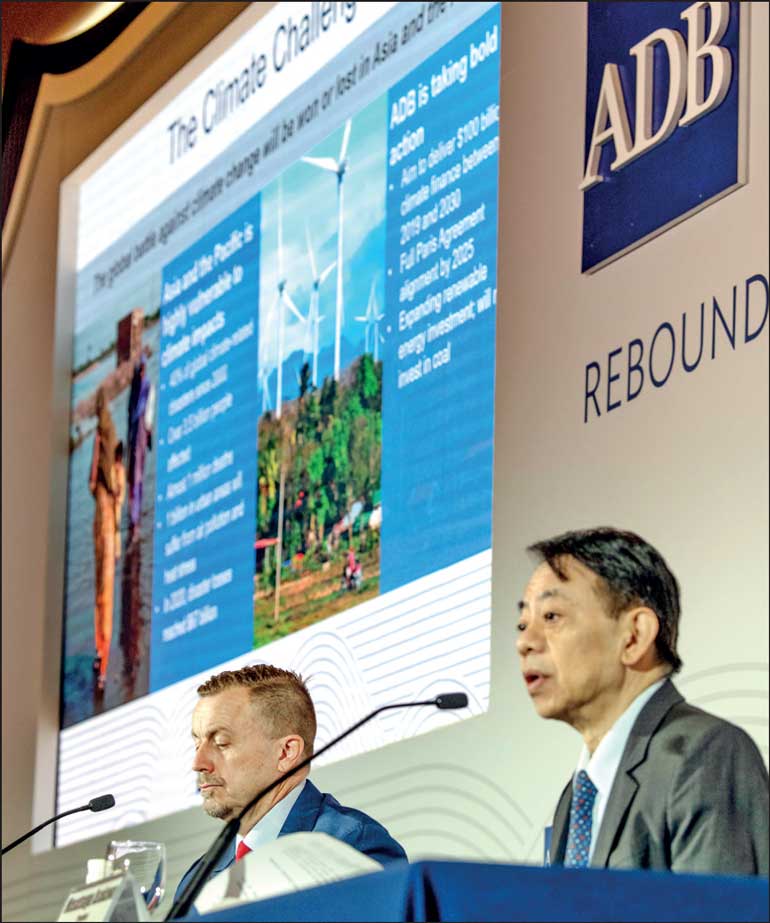Sunday Feb 22, 2026
Sunday Feb 22, 2026
Wednesday, 3 May 2023 00:00 - - {{hitsCtrl.values.hits}}

ADB President Masatsugu Asakawa addresses the global media at the opening press conference of the 56th Annual Meeting of the ADB Board of Governors in Incheon, Republic of Korea yesterday
By Charumini de Silva
in South Korea
Asian Development Bank (ADB) President Masatsugu Asakawa yesterday launched the Innovative Finance Facility for Climate in Asia and the Pacific (IF-CAP), a landmark financial tool to raise $ 100 billion, whilst stepping up its support for the region in the battle against climate change.
Speaking to journalists at the opening day of ADB’s 56th Annual Meeting in Incheon, South Korea, he noted that the IF-CAP is a global first in its scale and scope, placing climate action at the top of its development agenda.
“IF-CAP is an exciting, innovative program that will have a real impact. It is also another example of how ADB serves as the climate bank for Asia and the Pacific,” he said.
Noting that the new program will dramatically expand ADB’s capacity to respond to climate change, he said a leveraged guarantee mechanism for climate finance has never before been adopted by a multilateral development bank.
IF-CAP financing will contribute to ADB’s raised ambition for $ 100 billion from its resources for climate change for 2019-2030. ADB is in discussions with potential partners—such as bilateral and multilateral sources, the private sector, and philanthropies, including the Global Energy Alliance for People and Planet to catalyse climate investments.
“Climate change is the critical issue of our lifetime and here in Asia and the Pacific we are on the frontlines of that battle,” Asakawa said, adding that the climate events the world has experienced over the past 12 months will only increase in intensity and frequency, thus bold actions must be taken now.
He said the initiative gives them power to address climate change everywhere, and anywhere, that it is needed. IF-CAP financing will support both mitigation projects, to reduce greenhouse gas emissions, and adaptation projects, to build resilience to the impacts of climate change.
“The global battle against climate change will be won or lost in Asia and the Pacific,” Asakawa said, adding that it is an uncomfortable fact that around 50% of the greenhouse emissions were generated from Asia and the Pacific.
As per the ADB, since 2000, over 40% of climate-related disasters occurred in Asia and the Pacific.
Over 3.5 billion people have been affected, with close to one million deaths. By 2050, another one billion people living in urban areas in our region will suffer from harmful air pollution and heat stress. The developing member countries of the ADB have experienced physical losses worth billions of dollars due to climate-related events. In 2020 alone, the region faced a disaster loss of $ 67 billion.
“If we don’t act now, the increase in annual losses will outpace the region’s GDP growth. This is why ADB is taking bold climate action,” he cautioned.
The ADB President said they aim to deliver $ 100 billion in climate finance to their developing member countries between 2019 and 2030.
“We will fully align all our operations with the Paris Agreement by no later than 2025. We will expand our investments in renewable energy options, and we will not invest in coal,” he said.
IF-CAP’s initial partners are Denmark, Japan, the Republic of Korea, Sweden, the United Kingdom, and the United States. Those partners are in discussions with ADB about providing a range of grants for project preparation along with guarantees for parts of ADB’s sovereign loan portfolios.
Emphasising the significance of this innovative move, he said it is a fundamental shift from the traditional “one dollar in, one dollar out” facilities at MDBs, because of its multiplier effect.
“We aim to bring in approximately $ 3 billion for IF-CAP, which can unlock up to $ 15 billion of new ADB climate projects. This will allow ADB to significantly accelerate climate action and achieve more ambitious results,” he said.
The reduced risk exposure created by the guarantees will allow ADB to free up capital to accelerate new loans for climate projects. With a model of ‘$1 in, $5 out’, the initial ambition of $ 3 billion in guarantees could create up to $ 15 billion in new loans for much-needed climate projects across Asia and the Pacific.
Highlighting that climate change is borderless, the ADB President also said the IF-CAP will change the way it addresses climate change going forward. “Climate change demands innovative and all-encompassing solutions. IF-CAP will provide this. It will be the first ADB financing vehicle to serve as a one-stop shop for climate finance. This will make climate action across sectors and regions possible. It will also support both infrastructure and reforms that address climate changes issues,” he added.
Insisting that placing climate action at the top of the development agenda is crucial, he said the world must take bold and urgent action. “The ADB, and other multilateral development banks, have a critical role to play. They should be leaders in mobilising financing and expertise for climate action. ADB recognises that it must do more with the substantial resources that we manage. Placing climate action at the top of the development agenda is crucial,” he said.
“IF-CAP will change the way we do business. The region needs trillions of investments to combat climate change.
To help reach that level, we need to maximise our capital in new ways. IF-CAP will multiply ADB’s lending capacity through leverage. This will allow us to crowd in substantially more resources from the private sector, and other investors who share our commitment to climate action,” he explained.
ADB is committed to achieving a prosperous, inclusive, resilient, and sustainable Asia and the Pacific while sustaining its efforts to eradicate extreme poverty. Established in 1966, it is owned by 68 members—49 from the region.